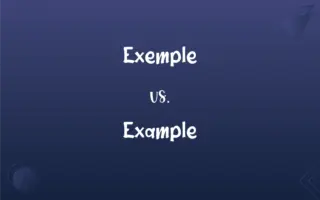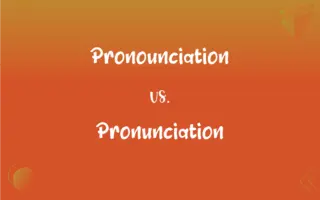Loyalest vs. Loyalist: Mastering the Correct Spelling
Edited by Harlon Moss || By Janet White || Updated on March 12, 2024
"Loyalest" is an incorrect spelling, while "Loyalist" is correct. A Loyalist is a person who remains loyal to established rulers or leaders, especially during revolt.

Which is correct: Loyalest or Loyalist
How to spell Loyalist?

Loyalest is Incorrect

Loyalist is Correct
ADVERTISEMENT
Key Differences
"Loyalist" refers to a person, whereas "loyalest" suggests a degree of loyalty which isn't used.
"Loyalest" sounds like it's trying to be a superlative (like "happiest") but it isn't.
"Loyalist" contains the word "loyal," a common English term.
Think of the historical term "Loyalists" referring to Americans who supported British rule.
Memorize this rhyme: "With a loyal twist, you get a Loyalist."
ADVERTISEMENT
Correct usage of Loyalist
He supported the team loyally, even when they were losing.
He supported the team as a loyalist, even when they were losing.
Loyally, she never missed a meeting of her favorite club.
As a loyalist, she never missed a meeting of her favorite club.
Loyalist Definitions
A Loyalist is someone steadfast in allegiance, especially to a governing power.
During the American Revolution, a Loyalist supported the British Crown.
A Loyalist is one opposed to revolutionary or rebellious actions.
The city had a strong Loyalist presence, resisting revolutionary ideas.
A Loyalist is a supporter who maintains loyalty, particularly in political contexts.
Loyalists were vital to the king during the rebellion.
A Loyalist is an individual loyal to an established government, leader, or cause.
He was known as a Loyalist during political upheavals.
A Loyalist remains true to their principles and affiliations, especially in times of revolt.
Even when many defected, she remained a staunch Loyalist.
One who maintains loyalty to an established government, political party, or sovereign, especially during war or revolutionary change.
Loyalist See Tory.
Loyalist One who supported the established government of Spain during the Spanish Civil War.
A person who is loyal to a cause, generally used as a political affiliation.
A person who adheres to his sovereign or to the lawful authority; especially, one who maintains his allegiance to his prince or government, and defends his cause in times of revolt or revolution.
A person who is loyal to their allegiance (especially in times of revolt)
Loyalist Sentences
She's known as a loyalist of traditional cooking methods.
His loyalist behavior towards the company impressed his bosses.
The party considered him a valuable loyalist.
FAQs
What is the verb form of Loyalist?
Loyalist is a noun; however, "to be loyal" is the verb form of the concept of loyalty.
What is the pronunciation of Loyalist?
Loyalist is pronounced as /ˈlɔɪ.ə.lɪst/.
Which vowel is used before Loyalist?
No specific vowel is inherently used before "Loyalist." Context dictates the preceding vowel.
Why is it called Loyalist?
It's called Loyalist because it denotes a person exhibiting or characterized by loyalty.
Which preposition is used with Loyalist?
Various prepositions can be used with "Loyalist" depending on the context, such as "of," "to," or "among."
Which article is used with Loyalist?
Both "a" and "the" can be used before "Loyalist" based on context.
What is the root word of Loyalist?
The root word is "loyal."
Which conjunction is used with Loyalist?
Any conjunction can be used with "Loyalist" based on sentence structure, such as "and," "or," or "but."
What is the plural form of Loyalist?
The plural form is "Loyalists."
What is the singular form of Loyalist?
The singular form is "Loyalist."
Is the word Loyalist is imperative?
No, "Loyalist" is a noun, not an imperative verb.
How many syllables are in Loyalist?
There are three syllables in "Loyalist."
What part of speech is Loyalist?
Loyalist is a noun.
What is the third form of Loyalist?
Loyalist is a noun, so it doesn't have verb forms.
Is Loyalist a countable noun?
Yes, Loyalist is a countable noun.
Is Loyalist an abstract noun?
Yes, Loyalist is an abstract noun as it represents an idea or quality.
How do we divide Loyalist into syllables?
Lo-yal-ist.
What is another term for Loyalist?
Another term for Loyalist could be "supporter."
Which determiner is used with Loyalist?
Determiners like "the," "a," "this," or "that" can be used with Loyalist based on context.
Is Loyalist a negative or positive word?
The connotation of "Loyalist" can be positive or negative based on historical or contextual usage.
Is Loyalist a vowel or consonant?
"Loyalist" is a word containing both vowels and consonants.
Is Loyalist a noun or adjective?
Loyalist is a noun.
Is Loyalist an adverb?
No, Loyalist is not an adverb.
Is Loyalist a collective noun?
No, Loyalist is not a collective noun.
Is the Loyalist term a metaphor?
No, Loyalist is not a metaphor, but it can be used metaphorically in certain contexts.
What is a stressed syllable in Loyalist?
The first syllable "Loyal-" is stressed.
What is the opposite of Loyalist?
The opposite of Loyalist, in a historical context, might be "Rebel" or "Revolutionary."
What is the first form of Loyalist?
Loyalist is a noun; it doesn't have verb forms.
What is the second form of Loyalist?
Again, Loyalist is a noun and doesn't have verb forms.
How is Loyalist used in a sentence?
During the American Revolution, Loyalists remained supportive of the British Crown.
About Author
Written by
Janet WhiteJanet White has been an esteemed writer and blogger for Difference Wiki. Holding a Master's degree in Science and Medical Journalism from the prestigious Boston University, she has consistently demonstrated her expertise and passion for her field. When she's not immersed in her work, Janet relishes her time exercising, delving into a good book, and cherishing moments with friends and family.
Edited by
Harlon MossHarlon is a seasoned quality moderator and accomplished content writer for Difference Wiki. An alumnus of the prestigious University of California, he earned his degree in Computer Science. Leveraging his academic background, Harlon brings a meticulous and informed perspective to his work, ensuring content accuracy and excellence.


































































